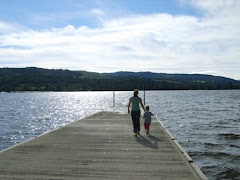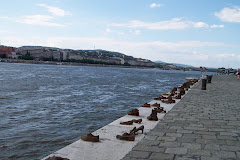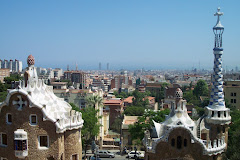1993 : Sitting by myself, wearing white leggings and big T-shirt; bare feet up on the opposite seat, boots under the table and a pile of library books in front of me. I’m watching a man with dark hairy arms, in the seat next to my feet. He has a pinky ring on his left hand and a sturdy beard buried in The Scotsman. Long hairs seep out of the neck of his cotton shirt. I wonder about his hands, how the long fingers would feel on my neck, tangled in my hair. Men like women with long hair. The glint of gold on his collar bone brings me to my senses; I can’t bear a man in chains. A child is grizzling further up the carriage - please let them get off at Berwick. Farmers are out hosing their fields. Still in the flat countryside of England, windbreaks of young trees laze in the beating sun. Fields of rape-seed turn the landscape into a painting with pylons etched between long looping power lines like suspension bridges.
Our table is littered with Yorkie bars, plastic glasses and orangeade. We were lucky the train was empty. I’d forgotten to book seats and had been worried but soothed with the idea of us all in separate carriages. Lee, Paul and Claire spread themselves out around the car but are now sitting together playing cards.We have become civilized travellers. I used to be the-mad-woman-on-a-train, screaming at my children under my breath, between my teeth and kicking their feet under the table. It was a case of, ‘Sit there, be quiet, give him that, leave her alone, don’t say things like that, look at the sheep, there’s the seaside, don’t, you’re the oldest, don’t talk to him then, play cards, shut up, leave me alone, give him some paper, see the mist rolling in, no you can’t, just because, shut up and sit down, Jesus Christ, you’re disgusting, blow your nose, I don’t know, another hour, watch my coffee, WILL YOU GIVE HER SOME PAPER!
'‘There’s the sea!’ Claire stands up. We’re coming up to Berwick. I like coastlines; see myself as The French Lieutenant’s Woman standing on the edge of land, pointing my tragic but beautiful face out to sea, watching for my future; waiting for something to happen. I want a house where the air is on the move: not stagnant - well-travelled air and a great expanse of sky. Sometimes I stand on the pier at Tynemouth. I’ve never been further than one night in Amsterdam.
Lee is 16, Paul 12, Claire 11…and I’m still alive. I dreamed the other night that I was smoking; I haven’t smoked for six years. The skin on my fingers is white/pink – nicotine stains long gone, nails white-edged. I dream a lot; sometimes they’re so strange I fear for my sanity – not the usual crazy feelings but real questions. I once dreamed that I halved Claire in two, put the bottom half inside the wardrobe and sat the rest of her up in bed. A day or two later a loud knocking on the door made me so afraid of what I’d done. I imagined a social worker at the door demanding to see my daughter. I tried to put her back together but the bottom half had withered slightly. Selotape held her together for the interview, which I don’t remember and everything turned out all right! I don’t know why I halved her in two.
A gypsy told my fortune last week. I saw her coming but couldn’t make my body avoid her. She grabbed my hand and talked fast with a strong Irish or country accent into my face. I couldn’t break free and could feel passers-by watching us as we stood beneath the hot air vents in the shopping centre. She said everything would be okay, that someone long-dead watched over me, that a man loved me and I would move house but not far. I kept asking her how much it would cost and she continued talking. As she tucked a small bunch of lucky white heather into my fist she asked me for three pounds. I couldn’t speak throughout the spiel, my chest was bursting into my throat. She took the money and I walked hard for the Haymarket exit, stumbled into Northumberland Street gasping for breath, trying to hold off tears. Why am I crying? I said to myself over and over again.
I glance at the children, ‘Look at the cows, they’re lying down. That means it’s going to rain.’ Lee is teaching them to play Chinese Patience. They’re not listening to me. I press my face to the window as the train curves. I can see its head and tail until my breath clouds the glass. Berwick is behind us now, only half an hour to Edinburgh. We spent a week in Berwick when Claire was one – she had her first birthday in a sand pit. The beach was impossible; it reeked of rotting seaweed, fumes waving up the cliff to keep us away from the edge. How many edges can there be in any one life?
Saturday, March 21, 2009
Monday, March 09, 2009
Extract from My Memoirs
‘There is a bleed,’ he said.
Not, ‘Your daughter has had a cerebral haemorrhage.’ No, I get the dumbed-down version. Her brain is bleeding into the nape of her neck, where it will disperse. Well that’s nice and tidy, isn’t it? I’m sitting in a tiny room being diagnosed as thick. I want to be bombarded with enormous words and unintelligible language. She’s only been here a couple of hours and has already had two brain scans; they wouldn’t spend that kind of attention on nothing. I’m choking here, trying to be passive and not in the least dangerous.
A new doctor, Mr Surgeon, throws an assortment of options on the table, all of which include the possibility of death. Claire is an adult and only she can make this choice.
‘I’m only nineteen,’ she screams. ‘I can’t make a decision like that.’
My heart is filling up all the space in my mouth.
‘With the operation there’s a fifty-per-cent chance of death.’ His face never moves and all I can hear is a death sentence. He stands at the bottom of the bed – this is nothing like the scenes in TV drama; he doesn’t take anyone’s hand or pat the patient’s arm.
‘What if she doesn’t have it?’ I ask.
‘It could heal itself, or she might fall into a coma.’ He’s a silver-haired automaton. ‘She could live the rest of her life and it wouldn’t burst again but…’
‘I can’t…’ she says. ‘Just do it.’ Her boyfriend is on the other side of the bed, frozen into silence.
The surgeon goes on to describe risks and complications during and after the operation, then in the recuperation period. She is all I can see and hear; her whole life is inside me - I’m pregnant with this beautiful young woman, this busy, loving and sparkling entity. Suddenly I’m a mother again. I’ll be her Rotwieller; she’s too nice; she’ll need me. My head fills with memories of other hospital trips; sons with broken bones, blood and gore and handsome doctors; sexy arms holding x-rays up to light boxes; long muscled thighs stealing my attention. This is different and I am consumed. Death has stalked me all my life but this is my children; I need to stand up and fight. I can’t be that woman anymore, that single parent with one eye on the lookout for the right Mr Right.
They said she'd have time to rest before the operation but here they are wheeling her bed out of its place, unlocking the brakes.
‘It’s only five o’clock,’ I say, walking beside the bed.
‘Mum! It’s too early. He promised.’ She’s crying, grabbing our hands.
‘My God,’ two of her aunts come around the corridor and fall into this scene. Jean is instantly terrified; her husband died ten years earlier from the same thing – he was sent home from three hospitals, nine visits in two days, to die in his armchair at the age of thirty-two.
We trail through the hospital to Theatre, like the day my mother-in-law was taken to the nursing home; the whole family followed her wheelchair, two-by-two, down the road to help settle her in, all of us trying to hide our tears from the children. My mind is flashing clips of film and all the while I walk beside the bed, holding her hand, shushing her, telling her it’ll be okay even though her voice and face are boring holes in my heart. I am stunned at how quickly they take her from me. Ron, her boyfriend, doesn’t know how to act and I lead him to the front door so someone can give him a cigarette. My sons clasp me in their arms and I am dwarfed.
How do you spend five hours while surgeons are cutting into your child’s head? You imagine anything but the saw that will split open her skull; you call everyone in your phonebook and ask them to send up prayers for your only daughter; you allow yourself to be held and soothed by an enormous extended family outside the building, where they keep arriving; and you attempt to drink the awful coffee, watching your six-foot nephew stand and drip tears onto the café table. Then you have to get away from them to be on your own, just a quick walk around the block, not long enough for them to worry. The traffic flows past me, unaware of my trauma, on its way to the tunnel, belching pollution but I need to take deep breaths; it doesn’t matter what goes into my lungs. I am caught in the glare of a huge sunflower painted on the side of a building – it’s a sign.
‘I won’t lose my daughter. I know this.’
When I come into sight of the family I feel them relax. We move upstairs into a waiting area opposite the lifts. Of course there are arguing factions; sisters-in-law not talking to each other, separating the group, all of us trying to ignore it. A lift opens and I catch sight of Mr Surgeon standing at the back. Suddenly I’m flying at him, aware that he wasn’t going to come out and talk to me. He leans across and presses the button to stop the door closing and walks towards me, still with the calm face.
‘Tell me, is she all right?’
‘Fine. No problems. She’s in intensive care. You can go down there now.’ He gives me this good news without an emotion, no smile, but I want to wrap my arms around him. Maybe I just did.
Only a handful of us stay. This family constantly amaze me at the support they instantly present at the first sign of trouble. I urge them to go home, promise updates. My two sons and Ron gather ourselves and move to intensive care.
This is my daughter; she is complaining about the tubes that are collecting around her neck, hanging down from her head; her hand tries to swat them away. It’s proof of her personality, her repaired brain. Even an atheist’s prayer is heard by whoever is up there; my friends are diverse and odder than normal – thank God for them.
On the day she was born I was surrounded; by the kind of neighbours who were part of normal life then, the knock-and-walk-in; gossip or begging bowl; founts of local knowledge. Meg from next door and Maggie through the wall were keeping an eye on me because I’d been in labour all day – if you could call it that. I’d had a little pain in the morning, regular enough to make me believe. My father-in-law came up to collect Lee for a birthday party. When I told him that I was in labour he brushed it off.
‘You’re not in labour. I should know, I’ve had fourteen kids.’
I made him take Paul with him too. It was a Saturday so Matt had gone off to do his thing but I’d warned him to keep calling for updates.
‘We should’ve paid the phone bill,’ I said. Father and son – nothing like each other and yet the instant deafness makes them twins.
The weight of that child bore me down but I couldn’t sit; I could only wander around the flat. There was no pain. Where I went Meg followed. Flo downstairs ferried messages up to us from Matt until they stopped. My waters broke and we sent her down to call the ambulance. I tried lying on the bed but when the urge to push came I leapt up and held onto the bunk-beds, crossing my legs, trying to keep her in. I was terrified of everything that could go wrong and frightened that the lack of pain was a bad sign.
‘Where’s the bloody ambulance?’ We all said it at one time or another and sent Flo back down to find out.
‘Eddie forgot to give the address,’ she said. ‘He’s out of his face but it’s on its way now. Hold on.’
She’d asked me earlier if I wanted a joint. I said no. It never did anything for me; alcohol had always been my thing.
‘Oh God I can’t hold it any longer. Flo, roll your sleeves up, you’ll have to do it.’
‘Shit.’
Meg was hanging out of the bedroom window watching for the ambulance. I kept ranting about germs and shouting at her to close it.
‘It’s here,’ she ducked her head back in, and then out again. ‘Hurry up, she’s delivering,’ she called down three flights to the crew.
The head was out and still no pain. Flo’s face froze. I was so glad to see the two uniformed men walk into my bedroom and take over – so was she. She moved up to my side and took my hand. Meg did the same on the other side. I told the ambulance man that I had no contractions.
‘So just take a deep breath and push when you’re ready,’ he said.
She came out in a rush and I didn’t ask what sex – I assumed it would be another boy. I couldn’t believe I had a girl at last. Meg threw the window up and leaned out.
‘It’s a girl,’ she shouted to the street.
Another ambulance arrived, bringing the midwife who delivered the afterbirth and took care of Claire. Maggie was in the kitchen making tea. My bedroom had never been so full – tea for eight.
They packed me onto a stretcher and took us downstairs; that was scary. The midwife carried Claire behind me. When we got outside the front door the whole neighbourhood was lined up applauding and wishing us well. I pulled the blanket over my face, wanting to kill Meg because she’d whipped them up and was embarrassing me…and that stupid Matt had missed it all.
And that stupid Matt missed most of her life; there is no explanation for his behaviour and neglect of his children – even a conundrum can be solved. He has been told and will be here tomorrow. Even after all this time I still want to kill him, pan his face in with a hot skillet, stab him to death with a blunt spoon but I will be calm. I won’t let acid drip from my tongue – Claire will be proud of me.
Not, ‘Your daughter has had a cerebral haemorrhage.’ No, I get the dumbed-down version. Her brain is bleeding into the nape of her neck, where it will disperse. Well that’s nice and tidy, isn’t it? I’m sitting in a tiny room being diagnosed as thick. I want to be bombarded with enormous words and unintelligible language. She’s only been here a couple of hours and has already had two brain scans; they wouldn’t spend that kind of attention on nothing. I’m choking here, trying to be passive and not in the least dangerous.
A new doctor, Mr Surgeon, throws an assortment of options on the table, all of which include the possibility of death. Claire is an adult and only she can make this choice.
‘I’m only nineteen,’ she screams. ‘I can’t make a decision like that.’
My heart is filling up all the space in my mouth.
‘With the operation there’s a fifty-per-cent chance of death.’ His face never moves and all I can hear is a death sentence. He stands at the bottom of the bed – this is nothing like the scenes in TV drama; he doesn’t take anyone’s hand or pat the patient’s arm.
‘What if she doesn’t have it?’ I ask.
‘It could heal itself, or she might fall into a coma.’ He’s a silver-haired automaton. ‘She could live the rest of her life and it wouldn’t burst again but…’
‘I can’t…’ she says. ‘Just do it.’ Her boyfriend is on the other side of the bed, frozen into silence.
The surgeon goes on to describe risks and complications during and after the operation, then in the recuperation period. She is all I can see and hear; her whole life is inside me - I’m pregnant with this beautiful young woman, this busy, loving and sparkling entity. Suddenly I’m a mother again. I’ll be her Rotwieller; she’s too nice; she’ll need me. My head fills with memories of other hospital trips; sons with broken bones, blood and gore and handsome doctors; sexy arms holding x-rays up to light boxes; long muscled thighs stealing my attention. This is different and I am consumed. Death has stalked me all my life but this is my children; I need to stand up and fight. I can’t be that woman anymore, that single parent with one eye on the lookout for the right Mr Right.
They said she'd have time to rest before the operation but here they are wheeling her bed out of its place, unlocking the brakes.
‘It’s only five o’clock,’ I say, walking beside the bed.
‘Mum! It’s too early. He promised.’ She’s crying, grabbing our hands.
‘My God,’ two of her aunts come around the corridor and fall into this scene. Jean is instantly terrified; her husband died ten years earlier from the same thing – he was sent home from three hospitals, nine visits in two days, to die in his armchair at the age of thirty-two.
We trail through the hospital to Theatre, like the day my mother-in-law was taken to the nursing home; the whole family followed her wheelchair, two-by-two, down the road to help settle her in, all of us trying to hide our tears from the children. My mind is flashing clips of film and all the while I walk beside the bed, holding her hand, shushing her, telling her it’ll be okay even though her voice and face are boring holes in my heart. I am stunned at how quickly they take her from me. Ron, her boyfriend, doesn’t know how to act and I lead him to the front door so someone can give him a cigarette. My sons clasp me in their arms and I am dwarfed.
How do you spend five hours while surgeons are cutting into your child’s head? You imagine anything but the saw that will split open her skull; you call everyone in your phonebook and ask them to send up prayers for your only daughter; you allow yourself to be held and soothed by an enormous extended family outside the building, where they keep arriving; and you attempt to drink the awful coffee, watching your six-foot nephew stand and drip tears onto the café table. Then you have to get away from them to be on your own, just a quick walk around the block, not long enough for them to worry. The traffic flows past me, unaware of my trauma, on its way to the tunnel, belching pollution but I need to take deep breaths; it doesn’t matter what goes into my lungs. I am caught in the glare of a huge sunflower painted on the side of a building – it’s a sign.
‘I won’t lose my daughter. I know this.’
When I come into sight of the family I feel them relax. We move upstairs into a waiting area opposite the lifts. Of course there are arguing factions; sisters-in-law not talking to each other, separating the group, all of us trying to ignore it. A lift opens and I catch sight of Mr Surgeon standing at the back. Suddenly I’m flying at him, aware that he wasn’t going to come out and talk to me. He leans across and presses the button to stop the door closing and walks towards me, still with the calm face.
‘Tell me, is she all right?’
‘Fine. No problems. She’s in intensive care. You can go down there now.’ He gives me this good news without an emotion, no smile, but I want to wrap my arms around him. Maybe I just did.
Only a handful of us stay. This family constantly amaze me at the support they instantly present at the first sign of trouble. I urge them to go home, promise updates. My two sons and Ron gather ourselves and move to intensive care.
This is my daughter; she is complaining about the tubes that are collecting around her neck, hanging down from her head; her hand tries to swat them away. It’s proof of her personality, her repaired brain. Even an atheist’s prayer is heard by whoever is up there; my friends are diverse and odder than normal – thank God for them.
On the day she was born I was surrounded; by the kind of neighbours who were part of normal life then, the knock-and-walk-in; gossip or begging bowl; founts of local knowledge. Meg from next door and Maggie through the wall were keeping an eye on me because I’d been in labour all day – if you could call it that. I’d had a little pain in the morning, regular enough to make me believe. My father-in-law came up to collect Lee for a birthday party. When I told him that I was in labour he brushed it off.
‘You’re not in labour. I should know, I’ve had fourteen kids.’
I made him take Paul with him too. It was a Saturday so Matt had gone off to do his thing but I’d warned him to keep calling for updates.
‘We should’ve paid the phone bill,’ I said. Father and son – nothing like each other and yet the instant deafness makes them twins.
The weight of that child bore me down but I couldn’t sit; I could only wander around the flat. There was no pain. Where I went Meg followed. Flo downstairs ferried messages up to us from Matt until they stopped. My waters broke and we sent her down to call the ambulance. I tried lying on the bed but when the urge to push came I leapt up and held onto the bunk-beds, crossing my legs, trying to keep her in. I was terrified of everything that could go wrong and frightened that the lack of pain was a bad sign.
‘Where’s the bloody ambulance?’ We all said it at one time or another and sent Flo back down to find out.
‘Eddie forgot to give the address,’ she said. ‘He’s out of his face but it’s on its way now. Hold on.’
She’d asked me earlier if I wanted a joint. I said no. It never did anything for me; alcohol had always been my thing.
‘Oh God I can’t hold it any longer. Flo, roll your sleeves up, you’ll have to do it.’
‘Shit.’
Meg was hanging out of the bedroom window watching for the ambulance. I kept ranting about germs and shouting at her to close it.
‘It’s here,’ she ducked her head back in, and then out again. ‘Hurry up, she’s delivering,’ she called down three flights to the crew.
The head was out and still no pain. Flo’s face froze. I was so glad to see the two uniformed men walk into my bedroom and take over – so was she. She moved up to my side and took my hand. Meg did the same on the other side. I told the ambulance man that I had no contractions.
‘So just take a deep breath and push when you’re ready,’ he said.
She came out in a rush and I didn’t ask what sex – I assumed it would be another boy. I couldn’t believe I had a girl at last. Meg threw the window up and leaned out.
‘It’s a girl,’ she shouted to the street.
Another ambulance arrived, bringing the midwife who delivered the afterbirth and took care of Claire. Maggie was in the kitchen making tea. My bedroom had never been so full – tea for eight.
They packed me onto a stretcher and took us downstairs; that was scary. The midwife carried Claire behind me. When we got outside the front door the whole neighbourhood was lined up applauding and wishing us well. I pulled the blanket over my face, wanting to kill Meg because she’d whipped them up and was embarrassing me…and that stupid Matt had missed it all.
And that stupid Matt missed most of her life; there is no explanation for his behaviour and neglect of his children – even a conundrum can be solved. He has been told and will be here tomorrow. Even after all this time I still want to kill him, pan his face in with a hot skillet, stab him to death with a blunt spoon but I will be calm. I won’t let acid drip from my tongue – Claire will be proud of me.
Subscribe to:
Comments (Atom)








